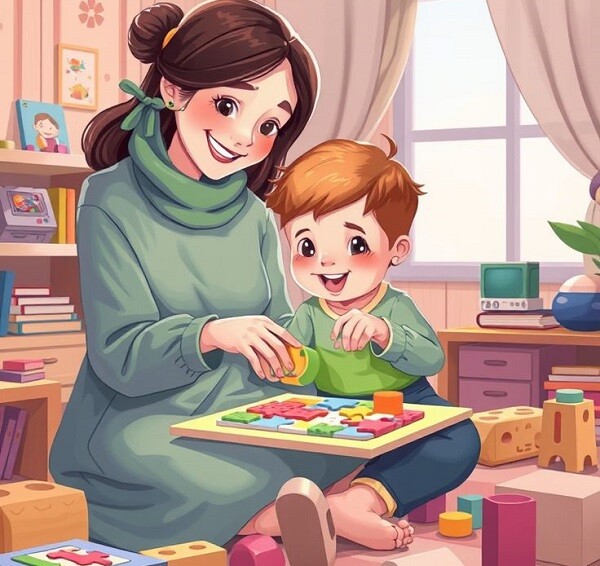There are distinct advantages to a child’s preference for playing outdoors versus staying indoors, and these preferences can have a significant impact on their cognitive development and overall growth. Both paths offer unique opportunities and benefits that shape their future.
As these children grow up, there will be noticeable differences between those who spent their childhood outdoors and those who preferred indoor activities. It’s essential for parents to recognize these differences and leverage their children’s strengths while also addressing any weaknesses.


Benefits of Outdoor Play for Children
Exposure to a Wealth of Unexpected Information
Due to the intense academic pressure, children’s time and energy are often tightly controlled, limiting their primary sources of information to family, books, and homework. This can confine them to an “information cocoon.”
A rich and varied environment, on the other hand, stimulates creativity. Children who play outdoors regularly encounter more unexpected information.
For instance, sudden weather changes, meeting new friends, or unexpected twists in outdoor plans provide uncertain, unpredictable elements that can be mentally stimulating for developing brains.
Research suggests that children who spend more than five hours a week outdoors exhibit more active brain development.
When children step outside their familiar indoor routines and are exposed to new stimuli, their brain activity increases.

A rich and varied environment stimulates creativity and brain development.
Learning to Build Relationships
A renowned writer once lamented that today’s youth seem to struggle with social communication. With most friendships formed within a small neighborhood or familiar circles, children have fewer opportunities to practice and refine their social skills.
As a result, they may feel shy or awkward around strangers, creating a significant barrier when they eventually venture into the broader world. Outdoor play, however, provides opportunities to meet new friends and build relationships.
For example, participating in outdoor activities, sports, and camping trips can be enjoyable experiences that also teach essential life skills.
Experiencing Real-Life Scenarios
According to experts, if parents’ resources and environment are limited, they should expose their children to places with richer resources and broader horizons. This helps children expand their perspectives, encounter different ways of thinking, and witness diverse lifestyles.
The further children can see, the more they can envision for their future. While books provide knowledge and fuel imagination, real-life experiences and sights can contribute to their maturity and personal growth.

What About the Benefits of Staying Indoors?
Gaining Accurate Basic Knowledge
Children who prefer to stay indoors and read extensively can still acquire a substantial amount of knowledge. While outdoor play offers a glimpse into the broader world, reading and indoor activities provide a foundation for future exploration.
In other words, when children don’t have the time or energy to explore the outside world and meet new people, reading books, watching documentaries, and engaging in indoor activities can be a way to learn about the world.
Moreover, compared to the uncertainties of the outside world, indoor activities allow children to selectively acquire knowledge that aligns with their interests and needs.
The Value of “Useless” Time
Reading seemingly “useless” books, engaging in “pointless” activities, and spending “idle” time all serve a purpose: they preserve the opportunity to surpass oneself and transcend the known.
In today’s fast-paced world of learning and education, many children are passively trapped in a cycle of “practical tourism” and “utilitarian reading.”
Having free time and space allows children to develop self-control, stimulating their curiosity and intrinsic motivation.

Indoor activities, such as reading, can provide children with a solid foundation of knowledge.
Enhancing Self-Awareness
An educator once wrote, “Why do children today often feel meaningless? Essentially, it’s because they rarely take the time to care for and love themselves.”
The most important ability for a person is to be at peace with oneself. While it’s crucial to see the world, it’s even more important to see oneself clearly.
Children who prefer indoor activities may progress at a slower pace, but they are still learning about the world through their unique experiences.
As I write this, I’m reminded of one of my favorite quotes:
“The world reveals itself to those who travel on foot, and a different world to those who travel on their armchairs.”
In reality, whether a child prefers outdoor play or indoor activities is not a significant concern. It corresponds to their stage of development, specific needs, and personal choices. Every choice opens up a unique world for them.

How Can Parents Support Their Children’s Development?
Method: Half Rules, Half Freedom
Psychologist Li Meijin once pointed out that it’s essential to establish rules for children under six years old.
Due to cognitive, physical, and mental developmental limitations, children rarely consider the consequences of their choices.
If given unlimited freedom, they might play to the point of forgetting to eat or becoming engrossed in screens. Therefore, imposing reasonable rules and boundaries helps children develop a sense of freedom within safe limits.
Additionally, when the boundaries and rules in their upbringing environment are clear, children can better sense their parents’ democratic attitude and learn to develop themselves more effectively.
Half Respect, Half Guidance
Tolerance does not mean indulgence. Parents should incorporate respect and guidance as their children grow.
For instance, for a tree to grow from a seed, it needs sunlight and rain, as well as the patient “pruning” of a gardener.

Reasonable rules and boundaries contribute to a child’s healthy development.
Half Permission, Half Acceptance
A thought-provoking perspective from a Tsinghua University student: Every child has two sides to their personality.
– A courageous child may also be impatient.
– A weak child may exhibit contradictory behavior.
– A mentally stable child may be content with an ordinary life.
– A gentle child may seek attachment…
The highest form of love is accepting and permitting all aspects of your child’s personality.
Allow your child to explore the outdoors if they wish, and accept their preference for indoor activities without forcing them to change. Remember, each child’s development is a unique, personalized process.
Since each child is unique, their growth and upbringing will vary. Respect their individual characteristics and guide them accordingly.




































